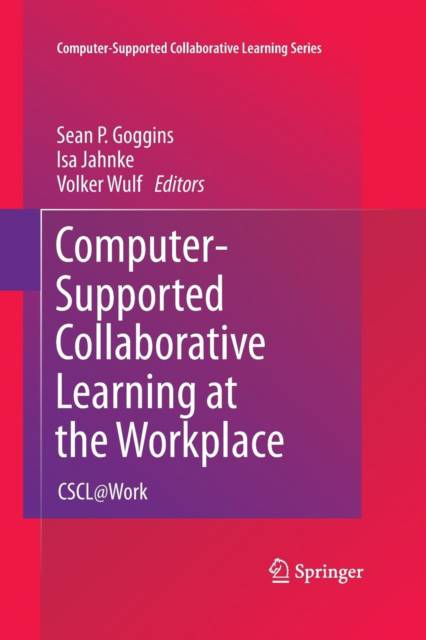
- Retrait gratuit dans votre magasin Club
- 7.000.000 titres dans notre catalogue
- Payer en toute sécurité
- Toujours un magasin près de chez vous
- Retrait gratuit dans votre magasin Club
- 7.000.0000 titres dans notre catalogue
- Payer en toute sécurité
- Toujours un magasin près de chez vous
Computer-Supported Collaborative Learning at the Workplace
Cscl@work
153,95 €
+ 307 points
Description
This book is an edited volume of case studies exploring the uptake and use of computer supported collaborative learning in work settings. This book fills a significant gap in the literature. A number of existing works provide empirical research on collaborative work practices (Lave & Wenger, 1987; Davenport, 2005), the sharing of information at work (Brown & Duguid, 2000), and the development of communities of practice in workplace settings (Wenger, 1998). Others examine the munificent variation of information and communication technology use in the work place, including studies of informal social networks, formal information distribution and other socio-technical combinations found in work settings (Gibson & Cohen, 2003). Another significant thread of prior work is focused on computer supported collaborative learning, much of it investigating the application of computer support for learning in the context of traditional educational institutions, like public schools, private schools, colleges and tutoring organizations. Exciting new theories of how knowledge is constructed by groups (Stahl, 2006), how teachers contribute to collaborative learning (reference to another book in the series) and the application of socio-technical scripts for learning is explicated in book length works on CSCL. Book length empirical work on CSCW is widespread, and CSCL book length works are beginning to emerge with greater frequency. We distinguish CSCL at Work from prior books written under the aegis of training and development, or human resources more broadly. The book aims to fill a void between existing works in CSCW and CSCL, and will open with a chapter characterizing the emerging application of collaborative learning theories and practices to workplace learning. CSCL and CSCW research each make distinct and important contributions to the construction of collaborative workplace learning.
Spécifications
Parties prenantes
- Editeur:
Contenu
- Nombre de pages :
- 333
- Langue:
- Anglais
- Collection :
- Tome:
- n° 14
Caractéristiques
- EAN:
- 9781489973887
- Date de parution :
- 15-06-15
- Format:
- Livre broché
- Format numérique:
- Trade paperback (VS)
- Dimensions :
- 156 mm x 234 mm
- Poids :
- 485 g

Les avis
Nous publions uniquement les avis qui respectent les conditions requises. Consultez nos conditions pour les avis.





